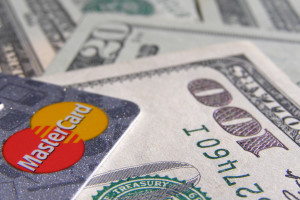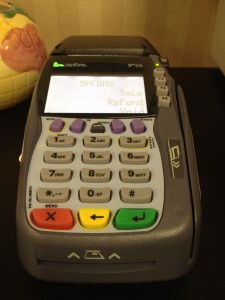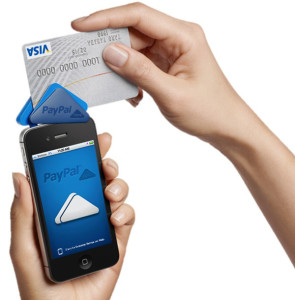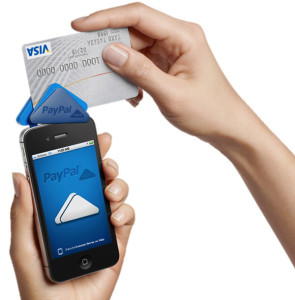Category: Credit Card Reader Terminal
February 18th, 2014 by Elma Jane
Payment Tokenization Standards
Tokenization is the process of replacing a traditional card account number with a unique payment token that is restricted in how it can be used with a specific device, merchant, transaction type or channel. When using tokenization, merchants and digital wallet operators do not need to store card account numbers; instead they are able to store payment tokens that can only be used for their designated purpose. The tokenization process happens in the background in a manner that is expected to be invisible to the consumer.
EMVCo – which is collectively owned by American Express, Discover, JCB, MasterCard, UnionPay and Visa – has announced that it is expanding its scope to lead the payments industry’s work to standardize payment tokenization. EMVCo says that the new specification will help provide the payments community with a consistent, secure and interoperable environment to make digital payments when using a mobile handset, tablet, personal computer or other smart device.
Key elements of EMVCo’s work include adding new data fields to provide richer industry information about the transaction, which will improve transaction efficiency and enhance the consumer and merchant payment experience by helping to prevent fraudulent card account use. EMVCo will also create a consistent approach to identify and verify the valid use of a token during payment processing including authorization, capture, clearing and settlement.
EMVCo’s announcement follows an earlier joint announcement from MasterCard, Visa and American Express that proposed an initial framework for industry collaboration to standardize payment tokenization. EMVCo says it will now build on this framework with collective input from all of its members and the industry as a whole.
Posted in Credit card Processing, Credit Card Reader Terminal, Credit Card Security, Digital Wallet Privacy, Electronic Payments, Financial Services, Payment Card Industry PCI Security, Visa MasterCard American Express Tagged with: American Express, authorization, capture, card account numbers, clearing, data fields, device, digital payments, Digital Wallet, Discover, EMV, emvco, fraudulent card account, interoperable, jcb, MasterCard, merchant, mobile handset, payment, payment processing, payment token, secure, security standards, settlement, smart device, specification, standardize, tablet, token, tokenization, transaction, visa
December 16th, 2013 by Elma Jane
1. Account Updater (Visa)
Incorrect billing information leads to declined credit cards, loss of sales and unhappy customers.
Visa touts its Account Updater as an easier way to keep customer data current. The tool appends all card data with up-to-date customer info so businesses can avoid difficulties over address changes, name changes, expired cards and more.
The tool can benefit any business that bills customers on a recurring basis.
It eliminates the need for manual administration, so it can lower your business’s operational costs and customer-service expenses. And by saving your clients the hassle of a declined payment, you can boost customer satisfaction and overall sales.
2. Netswipe
Paying online is convenient for customers, but keying in an unwieldy credit card number is still a pain.
Netswipe from Jumio gives customers an easier way: The tool lets users pay by snapping a photo of their credit card; it’s almost as easy as swiping your card through a traditional card reader.
According to Jumio, customers can use their smartphone or tablet to scan a card in as little as 5 seconds, whereas traditional key entry takes 60 seconds or more, on average. Having a quick and convenient way to pay could help contribute to a positive buying experience and encourage repeat business.
The system is compatible with any iOS or Android mobile device, as well as with any computer with a webcam.
3. Netverify
Jumio’s fraud-scrubbing tool helps you determine if your customers are who they say they are.
Net verify allows customers to snap a picture of their driver’s license or other identification using a smartphone, tablet or PC webcam. Once the image is taken, the tool can verify the authenticity of the documentation in as little as 60 seconds.
That’s much faster and more convenient than asking a customer to fax or mail a copy of their ID in the middle of a transaction.
The tool can verify identifying documents from more than 60 countries…including passports, ID cards and driver’s licenses, and even bank statements and utility bills. Jumio says its software is smart enough to automatically reject nonauthentic documents.
And customers can rest easy knowing that all submitted information is protected with 256-bit encryption to prevent identity theft.
Online merchants embed Netverify into their websites as part of the checkout process.
4. Payment Gateway
Payment Gateway service does all the heavy lifting of routing and managing credit card transactions online.
Portals like this one benefit small businesses by providing a fast and secure transmission of credit card data between your website and the major payment networks. It works a lot like a traditional credit card reader, but uses the Internet to process transactions instead of a phone line.
Payment Gateway also offers built-in fraud-prevention tools and supports a range of payment options, including all major credit cards and debit cards.
5. PayPal Here
Mobile credit card processing services like PayPal Here make it easy to accept credit cards in person using a smartphone or tablet.
PayPal Here and other similar services send you a dongle that attaches directly to your iPhone, iPad or Android device, allowing you to swipe physical credit cards wherever you are.
One major benefit of mobile credit card readers is that they work with the devices you already own. That means there’s no need to carry around additional hardware, aside from the reader add-on itself. Most credit card readers attach to your device via the headphone jack or charger port, and are small enough to fit in your pocket.
The smallest businesses have the most to gain by opting for mobile credit card readers, which are cheaper and far more portable than traditional options.
6. Virtual Terminal
If you do business online, your website needs the infrastructure to accept credit card information.
Web-based applications like virtual terminal offer the basic processing functionality of a physical point-of-sale system, and are easy to install on your business’s website.
The system allows merchants to collect orders straight from the Web, or take orders via phone or mail and before initiating card authorizations online.
It also includes extensive transaction history to help you manage payment data, split shipments, back orders and reversals. Business owners can even receive a daily email report of all credit card transaction activity from the prior day.
Posted in Best Practices for Merchants, Credit card Processing, Credit Card Reader Terminal, Credit Card Security, e-commerce & m-commerce, Electronic Payments, EMV EuroPay MasterCard Visa, Gift & Loyalty Card Processing, Mail Order Telephone Order, Merchant Cash Advance, Merchant Services Account, Mobile Payments, Mobile Point of Sale, Near Field Communication, Point of Sale, Smartphone, Visa MasterCard American Express Tagged with: account, Android, authenticity, card data, card reader, checkout, checkout process, credit card number, credit card transactions, debit cards, declined payment, expired, fraud, id, iOS, mail, mobile device, nonauthentic, online, online merchants, passports, payment data, payment gateway, payment options, phone, point of sale, recurring, smartphone, tablet, verify, visa, webcam
December 12th, 2013 by Elma Jane

Virtual Merchant Processing Gateway
Virtual Merchant
A virtual merchant is a website that sells goods and services to the public via online transactions with debit and credit card processing. The end result is a fully online experience where consumers can virtually visit a store to browse goods, purchase them fully online and receive them in the mail several days later, all from the comfort of your personal computer.
Virtual Merchant Element
Virtual merchants are made up of multiple features that basically make a website into an online store. Online stores provide e-commerce capabilities in the form of processing payments for orders and then shipping the goods or services either digitally or physically. Some brick and mortar companies may create a Web presence that only describes the store or displays the goods it sells, but they may not sell anything online.
Virtual merchants are a different breed from simple informational websites, utilizing a merchant account to create a secure online storefront. Merchant accounts create a contract between the store and online credit card processing companies. As part of this merchant account agreement, the virtual merchant pays the processor vendor a percentage of each transaction made via the online store. In some cases, this fee comes out to a monthly rate with a set per-transaction fee.
Virtual Merchant Services
Many virtual merchant services exist that cater to both online and offline business presences, though many that specialize in online retail offer more features and functionalities. These service providers offer virtual terminals to create a fully-functional payment gateway for processing purchases and creating a fluid shopping experience. Companies like National Transaction Corporation stand out as among the most popular of options due to their low merchant account fees and comprehensive virtual merchant services.
Benefits of Virtual Merchant
Virtual merchants expand the functionality of a website beyond a simple informational resource into a usable storefront. As is the case with most any type of online service, a virtual merchant service will help reduce overall work and costs associated with creating an online storefront, freeing you up to run your business as it was meant to be.
Using virtual merchant services for your website can benefit business in the following ways:
1. Easily integrates with your existing website for brand continuity
2. Facilitates more positive sales experiences
3. Improves customer service levels
4. Reduces administration and maintenance times for online retail websites
5. Removes geographic barrier from consumers, allowing for national and international sales
Secure information
Making each transaction as secure as possible becomes a main selling point of any company trying to build credibility through a Web presence. Virtual merchant services become an ideal solution as they offer all the necessary security measures to protect and keep private each buyer’s payment information.
The end result becomes that the payment process is protected through secured-socket layering (SSL) encryption to prevent data interception during an order, and account information is stored in multi-tiered firewall protection.
Straightforward online ordering
The most important part of any online purchasing experience is the ease of the ordering process. Through the use of features like a shopping cart, purchasing all items in the cart and creating an account to remember purchasing information all contributes to customer retention. When a consumer chooses to buy their goods online, a typical order processing form will entail entering credit card and billing address information as well as a shipping address and shipping options.
Each of these functionalities is ultimately governed through virtual merchant software to ensure a seamless and painless experience. The software is often available in one of two formats, either hosted or in-house. As a hosted solution, the virtual merchant service maintains the payment portal and allows you to edit its look and essentially create your store on their servers and databases. As an in-house solution, you install the software onto your own website servers and integrate the merchant application into the existing website. Both offer inherent benefits from customization to reliable management, but it ultimately depends on a company’s overall needs.
Posted in Best Practices for Merchants, Credit card Processing, Credit Card Reader Terminal, Credit Card Security, e-commerce & m-commerce, Electronic Payments, Internet Payment Gateway, Mobile Point of Sale Tagged with: credit card processing, debit and credit card processing, digitally, e-commerce, hosted, low merchant account fees, merchant account, online retail websites, online transactions, payment gateway, payment process, per-transaction, processing payments, processing purchases, processor, secure, store, storefront, transaction, virtual merchant, virtual terminals, virtually, website
October 31st, 2013 by Elma Jane
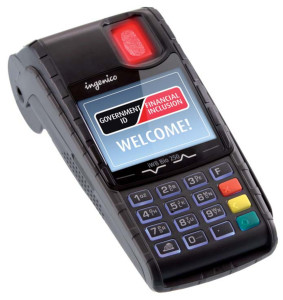
Ingenico Biometric Credit Card Terminal with EMV Chip and PIN Processing NFC.
Ingenico’s new biometric payment device (the iWB 220) is to be used in a pioneering project, to bring financial support to low-income families.
Payment solutions provider, Ingenico are to deploy Ingenico´s biometric solution in Colombia and the Dominican Republic, together with Carvajal Tecnología y Servicios, a player in the electronic payment industry in Latin America,
This biometric point of sale solution complies with the Image Quality Specifications for single finger capture device defined by the FBI, the United States Federal Bureau of Investigation.
In addition to high security standards, the solution is a mobile device with an embedded Magstripe, as well as Chip & PIN readers.
Upon government approval for each of the applications, funds will be sent to the banks and through the use of these unique devices, beneficiaries can withdraw their funds, with the use of a fingertip. Approved family members are the only ones able to withdraw the funds, and the government is assured that the benefit is being paid to the right person.
Posted in Credit Card Reader Terminal, Credit Card Security, Electronic Payments, EMV EuroPay MasterCard Visa, Payment Card Industry PCI Security Tagged with: banks, biometric, capture, Chip & PIN, deploys, device, electronic, finger, fingertip, funds, ingenico, iwb220, magstripe, mobile, paid, payments, readers, solution, withdraw
October 17th, 2013 by Elma Jane
National Transaction Corporation’s services will work with any existing (Non Proprietary) Terminal. NTC can reprogram an existing terminal as well as service and provide supplies for any terminal.
Below are the following Terminals and Model Type:
1. Hypercom – They produce electronic payment processing hardware and software for a wide range of industries. In 2009 Hypercom co-founded founding the Secure POS (Point Of Sale) Vendor Alliance, a non profit organization created by Hypercom, Ingenico and VeriFone to increase awareness of and improve payment industry security. Hypercom entered into a merger agreement with VeriFone, which closed August 4th, 2011.
Hypercom Machines: T7P – T7Plus – T4100 – T4210 – T4220 IP Terminal. For Precise Detail of the machines please check our website. www.nationaltransaction.com
2. Ingenico – is a leading provider of payment solutions, with over 20 million terminals deployed in more than 125 countries. Ingenico is a worldwide company, whose business is to provide the technology involved in secure electronic transactions. Its traditional business is based around the manufacture of point of sale payment terminals, but it now also includes complete payment solutions and related services. In 2008, after the merging with SAGEM Sécurité, Ingenico decided to close its historical R&D centre in Barcelona. This centre has developed Ingenico’s most successful family of EFTPOS (Electronic funds transfer point of sale). More than three million units sold worldwide in 2007. Ingenico acquired German payment processor Easycash in 2009. In 2011, Ingenico integrated Pennies, The electronic charity box, into one of their market leading mobile Chip and PIN payment terminals, allowing retailers to ‘switch on’ the Pennies solution so their customers can add a micro-donation to their bill when paying by card. As of 2012, over 15 million Ingenico terminals are deployed across 125 countries, with the Ingenico Aqua 50 being their best selling POS (Point Of Sale) terminal.
Ingenico Terminals: iPP220 – iPP320USB – iCT220 PIN Pad – iCT250 CounterTop – Agua PCI – i5100 Dial – i7780 HandHeld i778oM – i7780 Versatile Base – 7770 Intel Base. For Precise Detail of the terminal please check our website. www.nationaltransaction.com
3. VeriFone – is a global provider of technology for electronic payment transactions an international producer and designer of electronic payment solutions and value-added services at the POS (Point Of Sale). VeriFone provides merchant-operated, consumer-facing and self-service payment systems for the financial, retail, travel & hospitality, petroleum, government and healthcare industries. The company’s solutions are utilized by merchants, processors and acquirers in developed and emerging economies worldwide.
VeriFone Models: OMNI 3730LE/VX510LE N – OMNI 3750 4MEG DUAL COM – VX 510 6 MB DUAL COM 12MB – VX570 DUAL COM 6MB WITH SMART CARD – VX610 CDMA (AVAILABLE FOR SPRINT AND VERIZONE). For Precise Detail of the models please check our website. www.nationaltransaction.com
Posted in Credit card Processing, Credit Card Reader Terminal, Credit Card Security, Electronic Payments, Near Field Communication, Point of Sale Tagged with: 15100 Dial, 7770 Intel Base, acquirers, aqua 50, Aqua PCI, Chip and PIN, eftpos, electronic, electronic funds transfer point of sale, financial, healthcare, hospitality, hypercom, i7780, iCT220 PIN Pad, IP, iPP220, iPP320USB, mobile, Omni 3730LE, Omni 3750, paying, payment, point of sale, processor, retailers, Security, T4100, T4210, T4220, T7P, T7Plus, travel, VX 510, VX510LE, VX570, VX610
October 1st, 2013 by Elma Jane
As Capital One drops support Isis’ future darkens
Capital One pulling its support points to the challenges that near-field-communications is having with scale as non-NFC mobile wallet initiatives take off, as Isis gears up for a broader launch.
Capital One was one of Isis’ three founding card issuers, and the company’s drop of support as the company prepares for a larger roll-out emphasizes the challenges in gaining scale and momentum for mobile payments. PayPal and Apple’s recently announced their own mobile payment options that also avoid NFC reflect the opportunity that marketers see in services beyond NFC.
“Capital One dropping its support for Isis is significant in what it telegraphs about the problems issuers will continue to face with the wallet provider.” “Issuers must pay each time a consumer loads their card onto the wallet.”
“The caveat is that whether or not a consumer uses the card, the issuer must pay to have it in the Isis Wallet. Card issuers are interested in encouraging card spend whereas Isis is purely interested in getting consumers to link their cards to the wallet. This conflict of interest will continue to be problematic.”
Losing support
Capital One pulling its support from Isis could indicate that the financial institution did not see a substantial amount of consumers using their mobile devices to pay during the pilot for repeat visits, which is key in driving consumer adoption ahead. The number of mobile payment options available for card issuers to partner with is clearly growing, meaning that Capital One might see a bigger opportunity elsewhere.
However, Capital One’s pull-out could be well-timed since Isis is signing new partners, and Isis has an opportunity to recover quickly. “Many financial institutions and merchant acquirers see PayPal and Apple as threats and the moves that these companies are making could cause financial institutions, payment networks and acquirers to accelerate their mobile payments efforts in response to the perceived threat.” Since Isis is looking to partner with the financial institutions, payment networks and acquirers, the moves made by Apple and PayPal could drive partners into Isis’ embrace.
Google expands mobile wallet
Yesterday Google made a significant upgrade to Google Wallet that continues to focus on NFC, but also adds additional payment options for consumers. The Google Wallet app has been updated to let consumers send money to friends and family in the U.S. via an email address. Consumers can either send money directly from their bank account or from Google Wallet balance. Additionally, the app is now available for all Android devices that run the 2.3 operating system and higher. Previously, Google Wallet was only available on select Android devices. Consumers can also store loyalty cards from retailers that can be redeemed by scanning a mobile device in-store. Similar to Apple’s Passbook, Google Wallet will now also alert consumers when they are nearby to a store where they have a loyalty program.
Google said that it plans to support the one of 29 different NFC-enabled devices with NFC, but the company’s focus on additional features points to NFC as un-scalable by itself. In fact, Yankee Group estimates that 18 percent of device owners have a mobile device that supports NFC.
Apple, PayPal news
The interest around NFC has also significantly decreased as both PayPal and Apple are rolling out their own mobile payment options. For example, PayPal recently introduced its PayPal Beacon device that lets consumers pay hands-free in exchange for downloading the company’s app. The technology uses Bluetooth to pick up when a consumer is in-store to trigger a payment.
Apple is also working its way around NFC with its iBeacon technology that is rolling out in iOS 7. The technology lets marketers use Bluetooth around stores that can then be used to push out offers and relevant deals.
Both Apple and PayPal’s announcements emphasize the slow adoption that NFC has had in the United States. Although the technology has taken off internationally, it has had a harder time picking up steam in the U.S. because of the low number of NFC-enabled devices.
Broader roll-out
After running pilot programs, Isis is gearing up for a broader roll-out nationally. To date, most of the activity around mobile wallets has focused around the payment section of mobile wallets, which do not have as strong of a value proposition as the coupon and offers side that Isis is forced to prove to merchants.
Additionally, the education behind getting consumers aware of how to use the technology is still clunky, as evidenced by a test at a participating location in Austin by a local mobile consultant.
“Anything in the digital wallet space is a high-risk/high-reward venture at the moment and there are few if any profits being made in this space.” “When that is the case, business continuation is more a question of resolve than a question of competition.” Having multiple players in the market increases the overall quantity of marketing efforts that will take place in the mobile payments arena, increasing the probability that at least one product will succeed.
Posted in Credit card Processing, Credit Card Reader Terminal, Mobile Payments, Near Field Communication Tagged with: Apple, Capital One, google, ISIS, mobile, near field communications, nfc, Passbook, payment, PayPal, wallet, wallets
October 1st, 2013 by Elma Jane
PayPal announces updated app, device for hands-free, in store payment.
A busy few days at PayPal. Late last week, the global payments giant announced a major update to its app for Android and iOS. The new features have a strong mobile payments bent. And now, the company has announced the planned roll-out of “Beacon,” which uses Bluetooth Low Energy Technology to let customers check into retail stores and pay by verbal consent.
Paypal’s President calls the solution PayPal’s “most significant contribution to date in reinventing the in-store shopping experience.”
Beacon is a new add-on technology that merchants plug into an A/C outlet. When a PayPal customer walks into a participating store and agrees to check-in, Beacon triggers a quick vibration or sound to confirm a check-in; customer’s photo then appears on a point-of-sale screen. To pay, the customer simply gives a verbal confirmation. “No wallet and no card. Nothing to do. Not even touching your phone.
BLE was chosen to resolve some problems posed by traditional geo-location, including power consumption. It will look for any store running a PayPal compatible POS system, and will only transmit information to PayPal or to the merchant if the customer agrees to check in.
The solution aims to improve on the credit-card-swiping experience. PayPal figured the only better way to pay would be to do nothing.
The company will be piloting Beacon in the fourth quarter.
New App
PayPal’s vastly redesigned app for creating a more seamless in-store shopping experience is getting a lot of kudos across the web.
A New tab called “Shop” the first thing that appears when the app is opened, it displays nearby stores or restaurants that accept PayPal payments. Users can check in and open a tab, then select various payment methods from the check-in screen. Upon payment, the app generates a confirmation alert and sends an email receipt.
You’ve really got access to your entire wallet in the app.
The app also lets you order food ahead of your arrival bypassing the line. The feature works through PayPal’s partnership with Eat24 . Dinners can pay at the table, and at some locations, order more drinks.
For the first time, the app includes a Bill Me Later tab that lets users apply to finance PayPal purchases, and it integrates coupons and offers.
The company wanted the new app to help solve problem, and that payment isn’t something they typically complain about. So they focused on other potentially problematic experiences in the retail environment, waiting in line, waiting to pay the bill at their table and keeping track of coupons.
Posted in Credit Card Reader Terminal, Credit Card Security, Digital Wallet Privacy, Electronic Payments, Mobile Payments, Near Field Communication, Point of Sale, Smartphone Tagged with: Android, app, Apple, card, credit-card-swiping, geo-location, iOS, payment, PayPal, POS, retail, system, wallet
August 12th, 2013 by Admin
Small businesses are gaining traction in the mobile payment landscape. Mobile credit card readers attached to a smartphone or tablet now account for billions of dollars in m-commerce sales. “Together, mobile and social are transforming the way SMBs acquire and retain customers, With the heavy use of social media, SMB marketing is quickly becoming a two-way engagement rather than a one-way promotion.” Said Steve Marshall of BIA/Kesley. As more people switch to and upgrade their smartphones, AT&T, Verizon and T-mobile are looking to partner with digital wallet provider Isis. Read more of this article »
Posted in Credit Card Reader Terminal, Credit Card Security, Digital Wallet Privacy, Electronic Payments, Mobile Payments, Near Field Communication, Smartphone Tagged with: American Express, biometrics, electronic payments, iPhones, m-commerce, mobile, PayPal, recognition, Smartphones, Square

